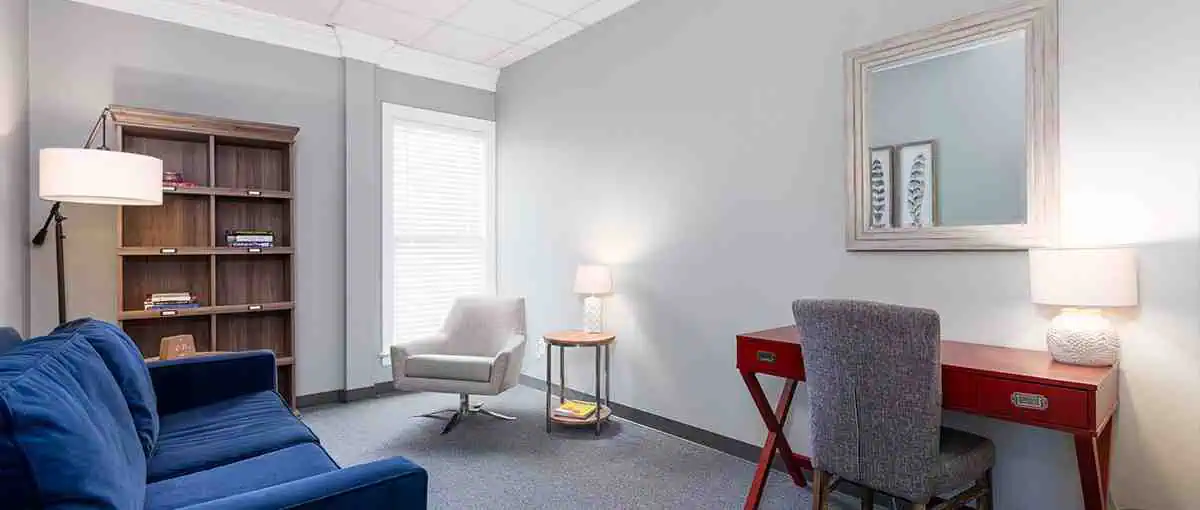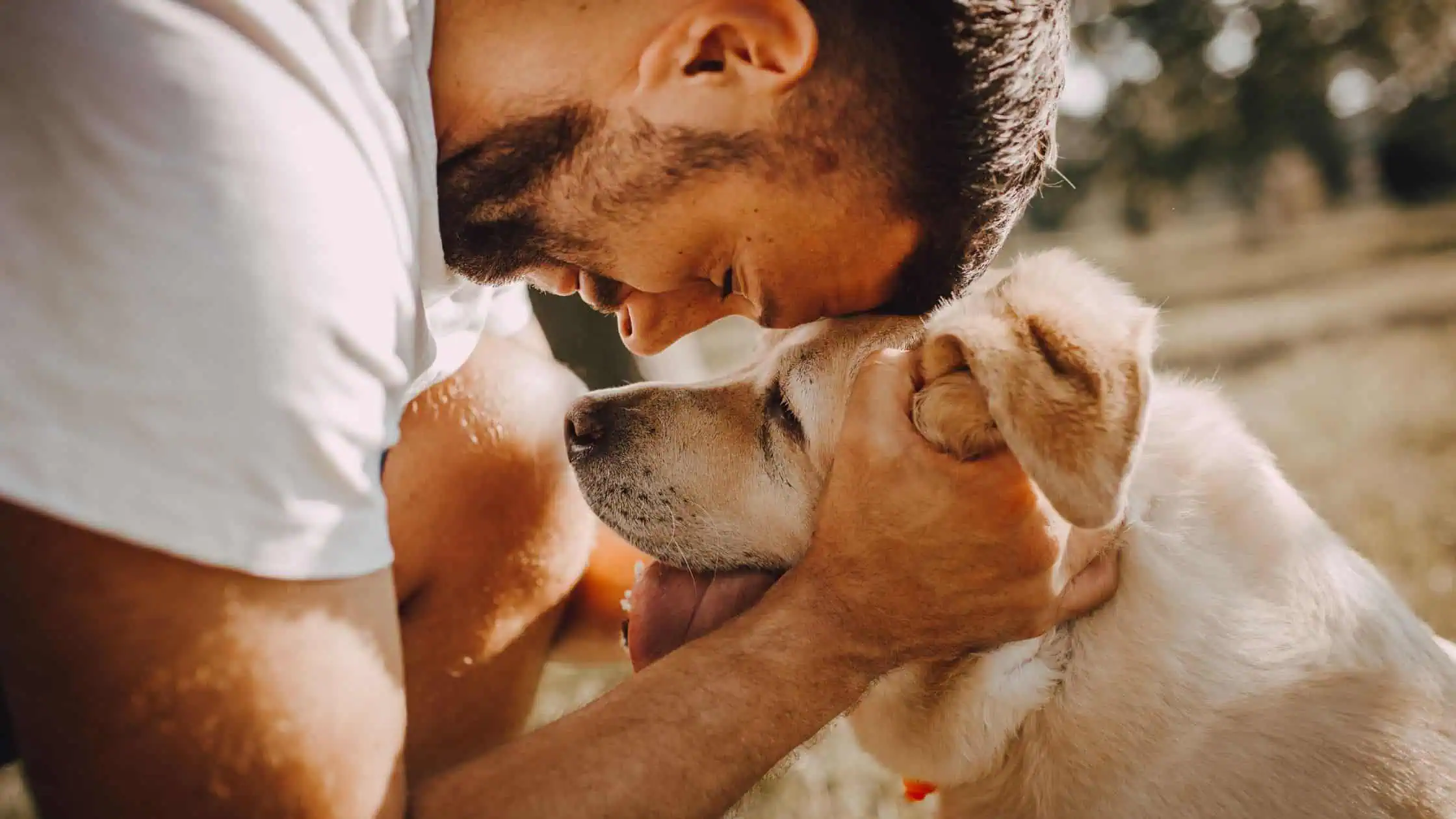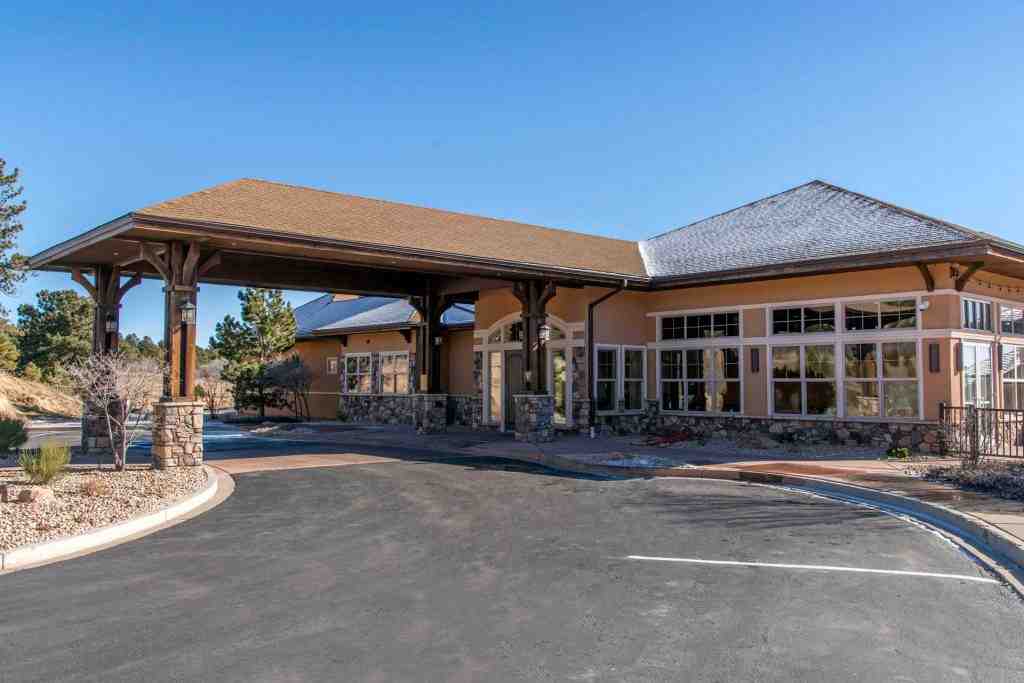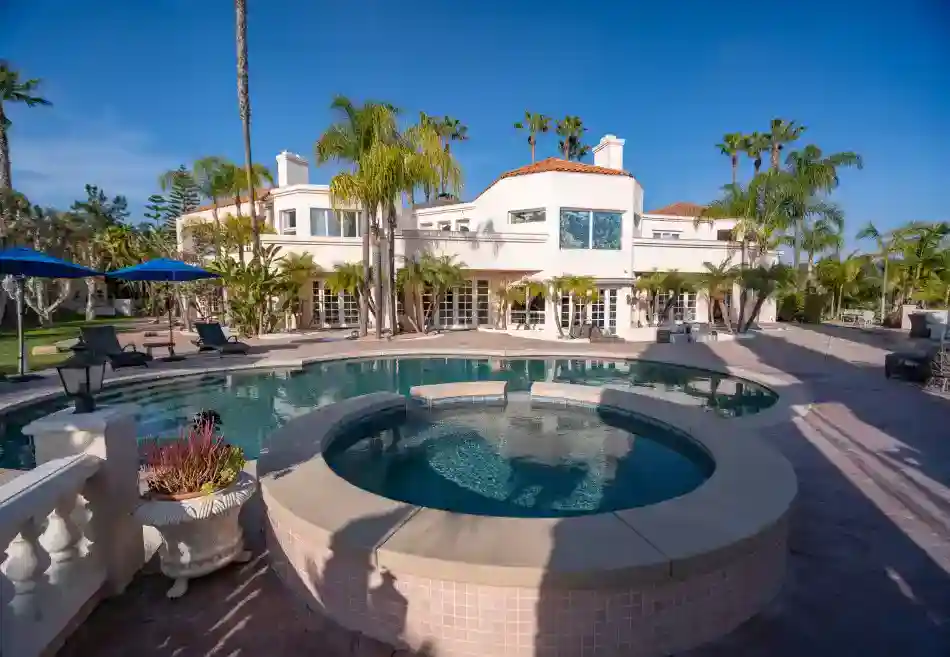
Finding Hope: Your Guide to Louisiana Drug Rehab Options
Louisiana drug rehab centers offer a lifeline to those struggling with addiction. With over 224 facilities, the state provides comprehensive care, from medical detox and residential programs to outpatient services and long-term recovery support.
Quick Overview: Louisiana Drug Rehab Options
| Treatment Type | Average Cost | Key Features |
|---|---|---|
| Medical Detox | $631.56/day | 24/7 medical supervision, withdrawal management |
| Residential/Inpatient | $56,822 average stay | Intensive therapy, structured environment, 28-90 days |
| Outpatient Programs | $59.83/day | Flexible scheduling, maintain daily obligations |
| Dual Diagnosis | Varies | Treats addiction + mental health disorders simultaneously |
Payment Options Available: Most facilities accept private insurance, Medicaid, Medicare, and offer sliding scale fees or state-funded programs.
While Louisiana reported 2,419 overdose deaths in 2021, there is hope. Hundreds of accredited treatment centers are equipped with evidence-based therapies and compassionate staff. Whether you need veteran-specific programs, adolescent treatment, or dual diagnosis services, Louisiana’s diverse landscape has an option for you. The key is finding the right fit.
Addiction Helpline America helps people steer addiction treatment, connecting them with evidence-based Louisiana drug rehab programs that match their needs and insurance. We provide confidential, compassionate guidance to cut through the confusion.
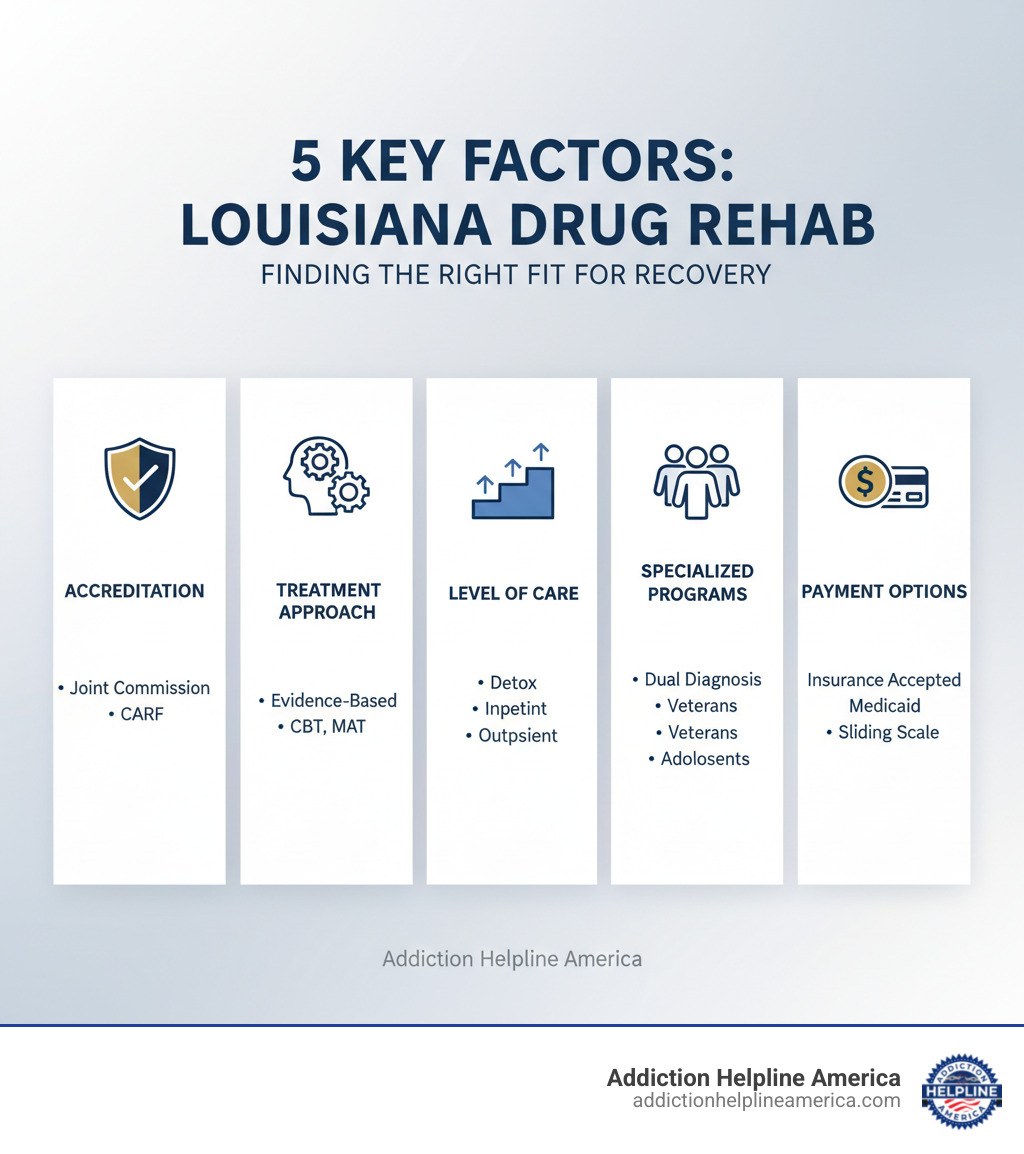
Must-know Louisiana drug rehab terms:
Understanding the Landscape of Addiction Treatment in Louisiana
Louisiana offers a rich variety of addiction treatment options designed for different stages of recovery. Understanding these levels of care, known as the continuum of care, helps you find the right support at the right time.
Levels of Care: From Detox to Long-Term Recovery
Most people move through different levels of care, starting with intensive support and transitioning to more independence.
Medical detox is the first step for many, providing safe, medically supervised withdrawal from substances like alcohol, opioids, or benzodiazepines. This typically lasts 3-7 days in a facility like Townsend Recovery Center, ensuring patient safety and comfort.
Residential/inpatient treatment offers the next level of care. Patients live at the facility for 28-90 days in a structured, drug-free environment, receiving intensive therapy and support. Lincoln Nova Vital Recovery in Ruston is an example offering a home-like atmosphere for recovery.
Partial Hospitalization Programs (PHP) are the most intensive outpatient option. Patients spend most of the day at the facility for comprehensive treatment but return home at night.
Intensive Outpatient Programs (IOP) provide a middle ground, with several hours of therapy multiple days a week while allowing patients to live at home. This is ideal for those stepping down from residential care or with a stable home environment.
Outpatient Programs (OP) offer the most flexibility, with weekly therapy sessions that fit around work, school, or family life. This level is best for those with less severe addictions or as a final step in treatment.
Aftercare planning is a crucial final step, creating a roadmap for long-term success through ongoing therapy, support groups, or sober living arrangements.
If you’re unsure which level of care is right, Addiction Helpline America can help. You can also find more info about Louisiana Addiction and Rehab Hotlines for immediate assistance.
Call Now – Your Journey to Recovery Begins Today!

Take the first step towards a healthier life! Call now to connect with our compassionate team and start your recovery journey today. Your path to healing awaits!
Our recovery specialists are available 24/7 to provide support, and all calls are confidential and free. Reach out anytime – we’re here to help!
The Critical Role of Dual Diagnosis Treatment
Addiction rarely exists in a vacuum. It often co-occurs with mental health conditions like anxiety, depression, or PTSD. Approximately 50% of people with substance use disorders also have co-occurring mental health disorders. This is known as a dual diagnosis.
Treating addiction without addressing the underlying mental health issue is like bailing water from a boat with a hole in it. The best Louisiana drug rehab programs use integrated care to treat both conditions simultaneously. Facilities like Baton Rouge Behavioral Hospital specialize in this approach, understanding that mental health and addiction are deeply interconnected and must be addressed together for lasting recovery.
Specialized Louisiana Drug Rehab Programs
Different people need different approaches to recovery. Louisiana offers specialized programs to meet unique needs:
Veterans: Programs like the one at Victory Addiction Recovery Center in Lafayette address combat trauma, PTSD, and military culture.
Licensed Professionals: Facilities such as Palmetto Addiction Recovery Center offer discreet programs for doctors, lawyers, and pilots who face unique pressures.
Adolescents: Age-appropriate treatment at centers like Acadiana Treatment Center in Sunset considers developmental stages and family dynamics for young people.
Gender-Specific Treatment: Bridge House (men) and Grace House (women) provide safe environments where individuals can openly discuss sensitive topics.
LGBTQ+ Affirming Care: Some facilities offer affirming care, recognizing the unique stressors and experiences of the LGBTQ+ community.
Faith-Based Programs: Centers like Adult & Teen Challenge Louisiana integrate spiritual guidance and Christ-centered principles into the recovery process.
Whatever your situation, a Louisiana drug rehab program is likely designed with your needs in mind. Finding the right fit is key, and personalized guidance can make all the difference.
Call Now – Your Journey to Recovery Begins Today!

Take the first step towards a healthier life! Call now to connect with our compassionate team and start your recovery journey today. Your path to healing awaits!
Our recovery specialists are available 24/7 to provide support, and all calls are confidential and free. Reach out anytime – we’re here to help!
A Closer Look at Premier Louisiana Drug Rehab Facilities
With over 200 facilities in the state, finding the right Louisiana drug rehab can be challenging. Here are several premier centers that represent the high-quality care Louisiana offers.
Palmetto Addiction Recovery Center: Excellence in Professional and Residential Care

Located in Rayville, Palmetto Addiction Recovery Center is known for its peaceful setting and effective, long-term residential care. A key feature is its Professionals Program, designed for doctors, lawyers, and others needing discreet, specialized treatment. Palmetto also emphasizes family therapy to repair relationships damaged by addiction. As a CARF-accredited facility, it meets high international standards for quality care. Learn more at Palmetto Addiction Recovery Center.
Victory Addiction Recovery Center: Support for Veterans and Families
In Lafayette, Victory Addiction Recovery Center provides evidence-based care with Joint Commission accreditation, a mark of national quality and safety. Victory stands out for its specialized veterans track, which offers targeted support for PTSD, trauma, and other challenges unique to military service members. Their comprehensive approach includes medical detox, individualized treatment plans, and a robust family program to involve loved ones in the healing process.
CADA of Northwest Louisiana: Community-Based Crisis and Residential Services
Since 1958, the Council on Alcoholism & Drug Abuse of Northwest Louisiana (CADA) has served the Shreveport-Bossier community. This CARF-accredited organization offers a full continuum of care, including a 24/7 Mobile Crisis Response Team for immediate intervention. CADA provides residential treatment with a special program for pregnant women and women with dependent children, allowing mothers to receive care without being separated from their kids. They also actively help clients access state-funded options and Medicaid.
Bridge House / Grace House: Long-Term, No-Cost Recovery
Bridge House (for men) and Grace House (for women) in New Orleans offer something remarkable: long-term residential treatment completely free of charge. This removes the financial barrier to recovery for those who have lost everything. Their model focuses on community, personal responsibility, and peer support. Residents can also participate in vocational training, learning valuable skills to help them build a new, stable life after treatment.
Woodlake Addiction Recovery: A Network of Accessible Care
With facilities in Abbeville, Baton Rouge, Ethel, and beyond, Woodlake Addiction Recovery makes quality treatment accessible across Louisiana. Their multiple locations allow clients to find care close to home or in a rural, peaceful setting away from triggers. Each center offers medically-supported detox and incorporates the 12-Step philosophy alongside evidence-based therapies in both residential and intensive outpatient programs.
Navigating the Cost of Louisiana Drug Rehab and Insurance
Concern about the cost of treatment is common, but Louisiana offers more pathways to affordable care than many realize. Understanding your financial options is a key step toward recovery.
Paying for Louisiana Drug Rehab: Insurance and Financial Aid
According to the National Center for Drug Abuse Statistics, an average inpatient stay in Louisiana can cost around $56,822. However, most people do not pay this full amount out-of-pocket.

Private Insurance: The Affordable Care Act requires most major insurers (like Aetna, Blue Cross Blue Shield, Cigna, and UnitedHealthcare) to cover substance use disorder treatment. Your policy likely covers a significant portion of the cost. Verifying your benefits is a crucial first step, which we can help with at Addiction Helpline America.
Medicaid: This state- and federally-funded program provides coverage for low-income residents, and 67 rehab facilities across Louisiana accept it.
State Funding and Grants: Louisiana’s Office of Behavioral Health oversees programs that offer subsidized or free treatment for eligible individuals.
Sliding Scale Fees & Payment Plans: Many facilities adjust their costs based on your income or offer payment plans to make treatment more manageable.
No-Cost Programs: Some centers, like Bridge House/Grace House and The Salvation Army in New Orleans, provide long-term treatment completely free of charge, supported by donations and grants.
Don’t let cost be a barrier. We can help you find an option that fits your budget.
Why Accreditations Matter: Ensuring Quality and Safety
Accreditations are your assurance that a Louisiana drug rehab center meets high standards for safety, quality, and ethical care.
The Joint Commission: This prestigious accreditation means a facility has passed a rigorous review of patient care, safety, and management practices. Victory Addiction Recovery Center holds this accreditation.
CARF International: The Commission on Accreditation of Rehabilitation Facilities certifies that a program is person-centered and committed to quality improvement. Palmetto Addiction Recovery Center and CADA of Northwest Louisiana are CARF-accredited.
State Licensure: All legitimate treatment centers must be licensed by the Louisiana Office of Behavioral Health, ensuring they meet basic health and safety standards.
These certifications, along with federal guidance from SAMHSA, provide independent verification of a facility’s quality. At Addiction Helpline America, we vet our network to ensure they hold these credentials, so you can be confident in your choice.
Call Now – Your Journey to Recovery Begins Today!

Take the first step towards a healthier life! Call now to connect with our compassionate team and start your recovery journey today. Your path to healing awaits!
Our recovery specialists are available 24/7 to provide support, and all calls are confidential and free. Reach out anytime – we’re here to help!
Frequently Asked Questions about Louisiana Drug Rehab
Here are answers to some of the most common questions we receive about finding help for addiction in Louisiana.
What are the common signs that someone needs addiction treatment?
Recognizing the signs of addiction is the first step toward getting help. Look for a pattern of these changes:
- Behavioral & Mood Changes: Increased secrecy, sudden mood swings, irritability, or loss of interest in hobbies.
- Neglecting Responsibilities: Failing to meet obligations at work, school, or home.
- Physical Signs: Increased tolerance (needing more of the substance for the same effect) and experiencing withdrawal symptoms (tremors, nausea, anxiety) when trying to stop.
- Relationship & Financial Problems: Frequent arguments, social withdrawal, unexplained debt, or selling possessions.
- Failed Attempts to Quit: Wanting to stop but being unable to do so.
- Continued Use Despite Consequences: Using even when it causes health, legal, or relationship issues.
If these signs are familiar, it’s time to seek professional help. Addiction is a treatable disease.
How can I support a loved one seeking treatment in Louisiana?
Your support can be a powerful factor in your loved one’s recovery. Here are effective ways to help:
- Participate in Family Therapy: Many centers, like Palmetto Addiction Recovery Center, offer family programs to heal relationships and improve communication. The Family and Youth Counseling Agency is another great resource.
- Educate Yourself: Understand that addiction is a disease, not a moral failing. This fosters empathy over judgment.
- Set Healthy Boundaries: Protect your own well-being and avoid enabling behaviors that support addiction rather than recovery.
- Offer Non-Judgmental Support: Let your loved one know you care and are there to listen without trying to fix everything.
- Encourage Aftercare: Support their involvement in support groups and ongoing therapy after rehab to sustain their progress.
Remember to take care of yourself during this process. Your well-being matters, too.
What kind of support is available after completing a rehab program?
Completing rehab is the beginning of a lifelong recovery journey. A strong aftercare plan is vital for sustained sobriety.
- Sober Living Homes: These provide a structured, drug-free environment that bridges the gap between inpatient treatment and independent living.
- Alumni Programs: Many rehabs offer these to keep former patients connected through events and a supportive community.
- 12-Step Groups: Alcoholics Anonymous (AA) and Narcotics Anonymous (NA) are free, widely available peer-support groups that have helped millions maintain sobriety.
- SMART Recovery: This is a science-based, self-empowerment alternative to 12-step programs.
- Continuing Care: Ongoing outpatient therapy helps individuals continue to develop coping skills.
- Peer Support Specialists: These are individuals in recovery who offer mentorship and guidance based on their own lived experiences.
These resources are crucial for building a fulfilling, sober life and preventing relapse.
Take the First Step Towards a New Life
Choosing a Louisiana drug rehab is a monumental step toward healing. The right program for you or your loved one is out there, whether it’s a dual diagnosis center, a long-term residential program, or a specialized track for veterans or professionals. The key is finding the one that fits your unique needs, but you don’t have to do it alone.
Your Path to Recovery Starts Here
Addiction Helpline America is here to provide the compassionate, personalized guidance you need. Our service is free, completely confidential, and connects you to a vetted network of high-quality treatment centers across Louisiana. We can help you understand your options, verify insurance benefits, and steer the admissions process, so you can focus on getting well.
From personalized alcohol and drug addiction treatment in New Orleans, Louisiana to options in Baton Rouge, Shreveport, and beyond, we can help you find the right fit. Recovery is possible, and the decision to seek help is the most powerful step you can take. Let us help you take it.
Our helpline is 100%
free & confidential
If you or someone you care about is struggling with drug or alcohol addiction, we can help you explore your recovery options. Don’t face this challenge alone—seek support from us.
Programs
Resources
Will my insurance
cover addiction
treatment?
We're ready to help
Find the best
drug or alcohol treatment
center
Are you or a loved one struggling with addiction? Call today to speak to a treatment expert.





